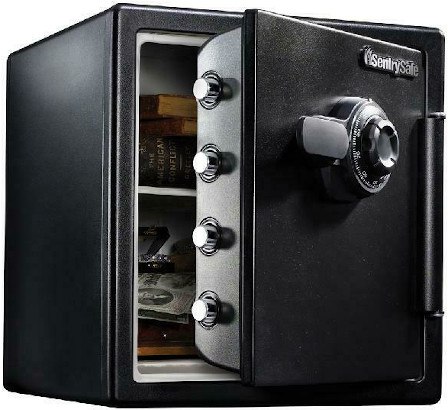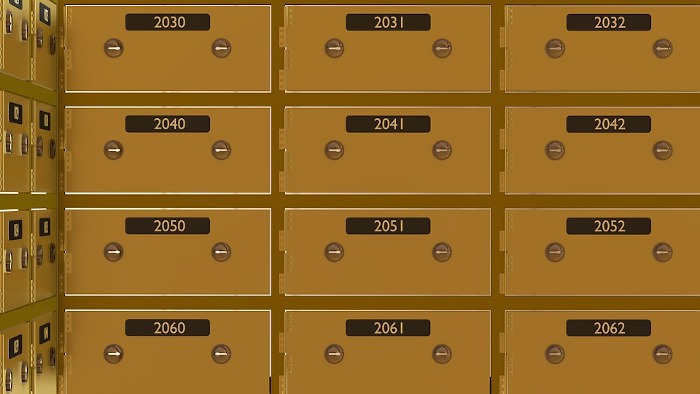If you plan to buy gold bullion then it's a good idea to plan ahead and decide where you are going to store it. There are different ways to store gold and mainly it comes down to personal preference. Below we will go over the different options and the pros and cons of each option.
At Home
Many people choose to simply store their gold bars and coins at home. It's the easiest and most hassle-free option.
One big advantage of storing at home is that don't have to pay an annual fee to store your gold in a safety deposit box or precious metals depository. Another advantage is that you will have immediate access to the gold so you can move it or sell it whenever you want.
The obvious disadvantage of home storage is that your gold could get stolen. It could get stolen from a family member/friend or from a home invasion. There's also the risk of misplacing your gold and not being able to find it. Another negative possibility is that the US government could seize your gold in the future. Gold seizure happened in the past when President Franklin D. Roosevelt issued Executive Order 6102. This order prevented hoarding and required citizens to sell their gold to the government by May 1st, 1933. President Gerald Ford later repealed the limitization on gold ownership.
If you choose to go with the at home option then there are some precautions to take. First, you should not tell anyone besides your immediate family that you have precious metals at home. This will eliminate a lot of risk. Secondly, it's highly recommended that you store your gold in a quality fireproof safe. This will ensure that your gold will never get damaged in the case of a house fire.
So what type of fireproof safe should you buy? Quality fireproof safes come in different sizes and the larger safes are more expensive. The small safes cost around $75. The medium-sized safes cost around $225. The large safes cost around $500. You'll want to buy a safe large enough to fit all the gold you have now and all the gold that you plan to buy in the future. Once you have a safe then it's also recommended that you hide your safe. Keep in mind that the larger the safe, the more difficult it will be to hide.

Precious Metals Depository
A popular option is to pay a service to store and guard your gold in a vault. You will pay an annual fee to the company managing the vault. The fee is usually around 0.5% of the total value of your holdings for amounts under $100,000. If the total value is over $100,000 then the fee percentage can decrease.
The advantage of using a precious metals depository to store your gold is that nobody will rob your home to take your gold. Precious metal depositories offer top-notch security. These depositories will also keep your precious metals in the best possible condition. They do this by keeping their vaults at an optimal temperature and humidity. Therefore your gold bullion will not get damaged due to environmental factors.
The top depository companies have accounting and audit services to make sure that your gold is accounted for. These companies also carry insurance polices so if any item goes missing or gets damaged then you will be financially reimbursed.
One of the main downsides of this storage method is the cost. The annual fee will add up over time. Gold is not an income producing asset, so although your gold may go up in value it will cost you to store it. In addition, you will have to trust the company. You will need to trust that they have your gold in storage and that they will allow you to take it at your request.
One other downside is that you won't have immediate access to your gold. If you need to sell your gold for quick cash then you won't be able to do so.
Note: Some people opt to use international precious metal depositories. If you use an international vault then the US government won't be able to confiscate your gold.
Bank Safety Deposit Box

Many retail banks offer safety deposit boxes that can be rented. You can put whatever you want in these boxes including gold bullion.
The average cost is around $50 for a 3" x 5" inch box, $115 for a 5" x 10" box, and $190 for a 10" x 10" box. The price will vary by bank and individual bank branches can set their own rates. So if you're curious about the exact costs then it's best to call your local bank to ask.
Storing gold in a safety deposit box has similar pros and cons to storing your gold in a precious metals depository. The difference is that safety deposit boxes are smaller so they won't be able to store as much gold per box. So if you have a lot of gold bullion to store then it would be cheaper to use a precious metals depository.
One advantage safety deposit boxes have over precious metals depositories is that you can access your gold quicker and easier (assuming you rent a safety deposit box at your local bank).
Conclusion
There is no one best location to store your gold. It mainly comes down to your personal preference and individual situation. Depending on how much gold you own, it might be best to use different storage methods. Storing all your gold in one place might not be the best idea. But if you have a relatively small amount of gold then you should be fine to store it at home in a fireproof safe.
